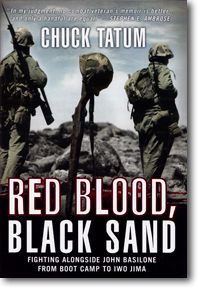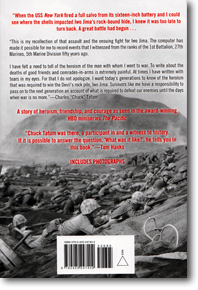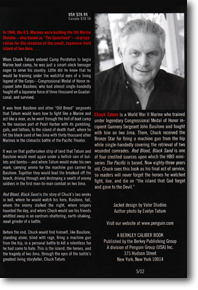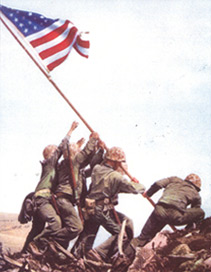100% Positive Reviews on Amazon.com



Red Blood, Black Sand:
with John Basilone on Iwo Jima
Review by drbear1945, May 22, 2012
This book was pretty great. I've been reading Pacific WWII memoirs for years, my Uncle served in the Pacific (he was a Seabee) and I'd put this one in the same league as "With the Old Breed" which I thought set the standard for Pacific Marines in WWII.
Chuck does a great job of pulling you into the story, it's like you're bought back to 1940s America, and the stories of boot camp and training (which I normally find redundant and often tedious) are instead very entertaining. Chuck shares pranks that will make you wonder how he wasn't killed by one of the old combat veterans in his unit (one actually tries) and you find yourself so engrossed in the characters that you want to flip to the end to see who survives the war because you can't imagine these wonderful men not making it.
The book starts to get serious when Chuck is designated to a machine gun squad and he meets his idol John Basilone. John becomes Chuck's sergeant and mentor and when they get separated (John's transferred to another unit) they reunite again, of all places, on the beaches of Iwo Jima where they lead the first breakout from the beach. Chuck's memories of John aren't from hearsay or observation; they're first hand experiences he shares of his time with one of America's greatest heroes.
The battle of Iwo isn't described by Chuck in casualty numbers or generalities; it's a second by second play back by a man who must have it permanently inscribed in his memory. I won't say more about Iwo but after reading it I went to bed that night wondering how any human can live through what they did that day. Watching their buddies get cut down, one, by one, by one. You keep expecting it to stop, but it just keeps going.
I give thanks to Chuck Tatum for reliving the war and writing this book. He says he's telling the story to honor his buddies and I think this book is an incredible tribute to them. I'm going to buy another copy (mine is kindle) and donate it to our local high school and I found some autographed copies through Valor Studios (a legit looking site I found that sells signed ones) and will get one to pass down to my kids. Men like Chuck Tatum are a dying breed and maybe if America's youth are exposed more to books like this one, rather then video games, I'll have better faith in my country's future.
Review by TX, June 7, 2012
They've been making movies about Iwo Jima for decades but until you read this book, it's difficult to understand the carnage on both sides that occurred. Even as an ex-Marine, the first-hand accounts were pretty shocking.
Review by RockinRod, June 7, 2012
Outstanding detailed must read personal account of a young Marine who landed in the first wave on Iwo Jima's beaches. A honorable memorial to those young men who gave the ultimate sacrifice for our great nation.
Review by DACHokie, June 7, 2012
HBO's epic mini-series "The Pacific" was magnificent in presenting a graphic and compelling presentation of the American experience in the Pacific theatre, but its broad perspective didn't generate the individual celebrity status that "Band of Brothers (BoB)" bestowed upon the men of Easy Company. I found the biggest difference between these two spectacular programs to be their sources. While "BoB" is derived from historian Stephen Ambrose's book about a particular combat unit, "The Pacific" is based on a trio of well-written memoirs from actual combatants. Charles Tatum's RED BLOOD BLACK SAND rightfully earns its place alongside Eugene Sledge's "With the Old Breed" and Robert Leckie's "Helmet for My Pillow" as an unforgettable must-read that bluntly depicts the horrific combat that US Marines faced in World War II.
Leckie was a natural writer that wrote his book, almost dutifully, following the war. Sledge wrote his book decades later as a cathartic release of painful memories. Charles Tatum's purpose seems to be a simple desire to document a first-hand account of surviving the hell of Iwo Jima ... a voice for the dwindling number of survivors still alive to tell the story. Like Sledge and Leckie, Tatum's perspective is that of the "grunt" ... the enlisted man that bore the brunt of extracting the fanatical Japanese from the island fortresses that dotted the Pacific Ocean.
Rather than a simple recollection of particularly blood battle, RED BLOOD BLACK SAND gives readers an idea of what lay ahead for teenaged American boys following the attack on Pearl Harbor ... enlisting, training and a trip to either Europe or the Pacific. Like many before it was the lure of a recruiter's "dress-blues" uniform that lured Tatum to the Marine Corps and, like Leckie, he spends about half his book detailing the time he spent becoming a Marine worthy of deployment (boot camp). Some readers may not like so many pages devoted to "idle" time (the nuances of his budding life as a Marine and all the training involved), but I found this a crucial and enjoyable part of the story. We see how the Marine Corps takes a gangly teenager and makes him a fighting man ... and how it's not all about rigid formality. The author does a great job detailing the life of a Marine recruit and educating readers on Marine vernacular and how The Guidebook for Marines dictated life in the Corps. I thoroughly enjoyed the author's penchant for troublemaking and the budding camaraderie within his unit. It is easy to realize the how innocent and naïve Tatum and his pals were ... totally unaware of the future hell they would be face. More than once, I found myself being reminded that "kids" were the ones who actually fought the war.
The second half of the book is dedicated to Iwo Jima and the tone is noticeably dark and serious. The first half of RED BLOOD BLACK SAND is invested in familiarizing readers with Tatum and his buddies ... the second half of the book rips everything to shreds. We spend a lot of time getting to know these men only to have them taken away again and again ... and again. Because Tatum never alludes to the fate of his friends in the first part, the impact of their deaths is more profound. The replacements come and go in short order ... his unit is decimated. The death and destruction on Iwo Jima is evident on every page and it is profound; Tatum does not refrain from providing the grisly details. Contrary to the book's title, Medal of Honor recipient John Basilone does not play a prominent role in Tatum's story. Other than expressing his idolization of "Manila John" when training and describing the events surrounding his death, the author doesn't devote much time on Basilone.
I found RED BLOOD BLACK SAND to be one of the more riveting and vivid accounts of combat ... on par with Sledge's book. I appreciated the author's candid approach to his time in boot camp; it offers a well-rounded view of one young man's total war experience. The book is organized in a manner that makes for a fast, satisfying read. Each chapter is comprised of small sub-chapters that are titled in a manner that details the sub-chapter. A superb and well-written memoir; I wish I had discovered it when it was first published almost 20 years ago.
Review by Michael C Homan, January 9, 2013
Bought it for my Grandfather who fought in Iwo Jima and he can't put it down!!! He says it is one of the best books on Iwo that he has ever read!!!!
Review by John E. Larsen "Larso", October 6, 2012
Tatum is another of the men represented in the TV series `The Pacific'. While his depiction there is quite limited, he was part of the small group of men that Medal of Honor winner John Basilone comman-deered to force a way off the beach when the landing on Iwo Jima had stalled. His story here covers his Iwo Jima experiences in considerable detail as a member of B/1/27 of the 5th Marine Division.
The author was a very keen volunteer for the Marines, joining up in the middle of 1943. He writes in great detail of his training and the other experiences he had as a young man venturing into a dangerous world. He likes the marines and Basilone is his hero and he is extremely excited when he is posted to the newly forming 5th Marine Division and finds that Basilone will be in his regiment. He meets him early on and writes in some detail of Basilone's attention to detail and professionalism as a fighter. He then goes into great detail on the landing on Iwo Jima and his part in Basilone's fighting group. He then witnesses his death and writes quite a bit about the impact this had on himself and others. This section gives a lot of information for those interested in this marine hero.
The bulk of the book then covers Tatum's extensive combat on Iwo Jima. He is a machine-gunner and is in the front line - such as that existed. Japanese shelling was intense and Tatum was in a constant state of action and tension. He fires on the enemy and is very much at the sharp end. This continues for fourteen days until Tatum is sent back with exhaustion. Tatum writes a day by day account of his experiences and it is very detailed. There is a lot on the awfulness of the fighting but also a lot on his comrades. Tatum was a bit of a prankster in training and he had a mixed relationship with quite a few of his fellows. It humanizes him and them, and the relentless grind of battle is all the starker for it.
There is much to like about Tatum's account. He is very candid about what he saw and did. His regard for Basilone is evident, he records his admiration at length and then provides an eyewitness account of the man's last action and in my opinion does not unduly exploit his connection. I learned a lot about the formation of the 5th Division and how important it was that it received a solid leavening of experienced marines, including many former marine paratroopers. There is a lot on the awful conditions on the ground, the poor supply and sanitation and of course the intense scale of the combat. Tatum gives figures for the casualties at various points and it is chilling reading. There are also fascinating things about the campaign like the use of sniffer dogs. There is then very informative information about the evacuation procedure and thankfully a few chuckles. Tatum also gives some thoughts on the making of the TV series and the post-war lives of those of his comrades who survived. It is in the end quite a full account of being a combat Marine in WW2.
I highly recommend this book. It is though still shaded by the likes of Sledge and Overton and others, hence the 4 stars - which in my opinion is still a pretty good score. See my list for where I think it sits against other combat accounts from the Pacific.
Review by Gary J. Chenett "gary j chenett", October 6, 2012
This is unfortunately the end to first hands reports via books written by Veterans who served during the invasion of Iwo in WWII.
This is a first edition book just released in the last 60 days by Chuck Tatum one of the few remaining Heroes who servived the horrors of Iwo. His life and times on that piece of volcano with no fresh water and a enemy who was relentness in their tries to anniliate every American who came ashore, POW was not a world the Japs understood....
If you enjoyed Pacfic and like history it gets no better than Chucks book, Chuck went into Iwo as a Assitant Machine Gunner and quickly found his friends and members of his Company shot and either killed or wounded out from under and around him....
Chuck unfortunately witnessed the death of Medal of Honor Hero John Basilone...
who of course was awarded his Mwdal of Honor for service in Guadacanal. Chuck
was writes to us in a laid back manner the report of the actual carnage and killing he lived through until he was one of the few survivors of the original amphibious landing.
I especially enjoyed his writing skills, he did not aviod describing combat in deatail but he also tells the readers of the day to day life these men experienced as the Japs fought to their last man., The book is riviting....
There were no prisoners left other than a few Korean POW's who didn't commit suicide as most of the Japs did if they were alive as the battle reached it's cresendo and then Chuck and his friends had to dig out every Jap survivor and kill them because they refused to surrender.
A few of the Japanese survived only because they were to badly wounded to kill themselves in any way possible.
I highly recommend this book, it is not just another story, it's the story of Chuck Tatum's life in IWO and even when he finished his tour during WWII and returned to the States.
His recounting of what life was like for American citizens was interesting..
I promise you that you will have a hard time putting this book down and it helps I feel put a Honorable Close to all Veterans who fought in Iwo.
Chuck shows a high regard for the Japenese, as he says they were just doing their job as he did...he also contrary to what few Americans will realize are never worth the trie horrors of war.
Trying to find any reasonable excuse for war is hard to justify if you have had to experience the unfortunate task of serving on a battle field.
Thank God Chuck survived and can say I did my job just a little better than my enemy did and he is mystyfied how so many thousands of rounds fired in and around his positions missed hitting him. I think again most combat Veterans at one time or another stop and ponder this same thought.
Buy it, rent it, whatever youn prefer but read it, it's a piece of American History that never needs to be NEVER forgotton.
This is a place (Iwo Jima) that now can only be visited once a year by Americans and has had it's name changed...
To bad we have left the gate open for the Japenese at Pearl Harbor.
God Bless to all who served and have made our Great Country what it is today.
I am a proud disabled Vietnam combat Veteran (67/68) who will to my last day do all I can to try & preserve the Memory of all of the sacrifices our ALL Veterans of every war, conflict or who have served,.
All of these Patriot's knew or know that they were or are putting themselves in harms way and willing took a Oath the if needed they would have given their lives or health for our Freedoms
Gary
Review by Dan, June 23, 2012
A really good book about real-life heroes. But was it ever edited? Some sentences are repeated verbatim. The 180th meridian is not the equator (which is the 0 degree parallel of latitude), it is the international date line. Anyhow, going from Hawaii to Iwo Jima doesn't involve crossing the equator, because both islands are located in the northern hemisphere. And "shanker mechanic" should be "chancre mechanic".
Review by Jack Palmer, February 5, 2013
As a 26 yr multi wounded veteran of Viet Nam/Desert Storm, and a student of WWII, I look for books written 1st hand by those of that generation who faced the elephant.As heroic as the known and unknown warriors of that era, it disturbs me that an editor didn't bother to advise the author that using ( that is marine speak for...) to explain some word or phrase that he used; it became very annoying. I suspect that it remained in the book with the thought that those who would read the book were so lame as to need that annoyance/explanation. Whenever I read of the island battles of the Pacific, it so touches me of the horror and hell on earth that these warriors worked through to get the mission done against such a determined foe. the book does a good job of following a US Marine and his machine gun squad through their prep for the assualt on Iwo Jima; many books have been written about the various Pacific battles, so here is another view from someone else who "got it done."
Review by Janet Tien "JT", January 26, 2013
By now I have read quite a few of these WWII Pacific narratives, and this book still holds my interest. It is quite well written, descriptive, and colorful. Not as emotionally impacted as Sledge's.




